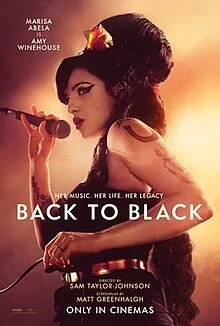Upcoming Amy Winehouse biopic sparks controversy
Photo Courtesy: StudioCanal
Since its announcement in 2018, Back to Black, the highly anticipated biopic chronicling the life and career of Amy Winehouse, has sparked significant controversy. Fans and critics alike have questioned its representation of Winehouse and its ability to uphold and celebrate her legacy.
Set to enter cinemas on the 12th of April, the film features Industry star Marisa Abela as Amy Winehouse, with Skins’ Jack O’Connell starring alongside Abela as Blake Fielder-Civil, Amy’s husband. Under the direction of Nowhere Boy and Fifty Shades of Grey filmmaker Sam Taylor-Johnson, the upcoming film will highlight Amy’s “extraordinary genius, creativity and honesty that infused everything she did”, following a “journey that took her from the craziness and colour of '90s Camden High Street to global adoration, and back again.”
However, the trailer’s recent release was met with significant backlash, with several fans questioning whether it was too soon after Amy’s death to be making a biopic about her life. Fans have voiced concerns that the film may lean more towards exploiting her struggles with fame and substance abuse, rather than celebrating her talent and achievements as an artist.
This is not the first time that the film has received criticism for its representation of Winehouse; when images of Abela on set surfaced last year, portraying a distressed Winehouse with smudged makeup and a tousled beehive, fans took to social media to question the film’s direction and sensitivity, with others demanding the film be boycotted altogether. Amy’s friends also voiced their anger towards her father, Mitch Winehouse, for allowing scenes of her overdose to be filmed at her old flat.One friend expressed their frustration that the film is “reliving all the darkest moments in her life, when there were so many more amazing moments, claiming that Amy would “hate that they’re focusing on all the dark stuff that she went through.”
Despite this, the film has received its full blessing from the Amy Winehouse estate, with Mitch publicly voicing his support for the biopic and the choice to cast Marisa. However, the estate’s involvement may result in a few aspects of Amy’s life being omitted from the film, including her strained relationship with her father and the allegations that he pressured her into performing rather than ensuring she received medical assistance. These claims were previously brought to light in Kapadia’s 2015 documentary “Amy” but were denounced by Mitch, who claimed the film painted himself and the family in the “worst possible light.”
The upcoming release of Back to Black fuels the ongoing discourse surrounding biopics, with recent criticism of films such as Blonde and Priscilla accusing them of glamorizing and exploiting these women’s suffering for profit, highlighting the fine line between artistic interpretation and respecting an individual’s memory and legacy. However, these critiques also raise a much larger question for the film industry: Can a biopic ever truly avoid being exploitative? Is it ethical to make a film about an individual’s life when they are not here to consent to it, or have any power over how their image is being portrayed? Only time will tell whether Back to Black will successfully pay homage to the iconic legacy of Amy Winehouse, or if it will, like its counterparts, follow the path of sensationalizing the artist’s struggles and her tragic death.

